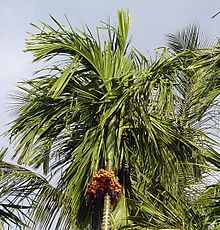Areca catechu

Areca catechu is a species of palm which grows in much of the tropical Pacific, Asia, and parts of east Africa. The palm is believed to have originated in the Philippines,[1] but is widespread in cultivation and is considered naturalized in southern China (Guangxi, Hainan, Yunnan), Taiwan, India, Bangladesh, the Maldives, Sri Lanka, Cambodia, Laos, Thailand, Vietnam, Malaysia, Indonesia, New Guinea, many of the islands in the Pacific Ocean, and also in the West Indies.[2][3][4]
Common names in English include areca palm, areca nut palm, betel palm, betel nut palm, Indian nut, Pinang palm and catechu.[1] In English this palm is called the betel tree because its fruit, the areca nut, is often chewed along with the betel leaf, a leaf from a vine of the family Piperaceae.
Areca catechu is grown for its commercially important seed crop, the areca nut.
The cities of Tanjung Pinang, Pangkal Pinang in Indonesia, the Indonesian province of Jambi (jambi or jambe is areca in Javanese, Sundanese, Balinese, and Old Malay), Penang Island, off the west coast of Peninsular Malaysia, Fua Mulaku in the Maldives, Guwahati in Assam, and coastal areas of Kerala and Karnataka in India, are some of the places named after a local name for areca nut. Actually, there are numerous city and areal names in Indonesia and Malaysia using the words pinang or jambe. This shows how important areca nut is in the Austronesian civilization, especially in the modern day Indonesia or Malaysia.
Chemical composition
The seed contains alkaloids such as arecaidine and arecoline, which, when chewed, are intoxicating and slightly addictive. Areca palms are grown in Bangladesh, India, Indonesia, Malaysia, Taiwan and many other Asian countries for their seeds.
The seed also contains condensed tannins (procyanidins) called arecatannins[5] which are carcinogenic.
